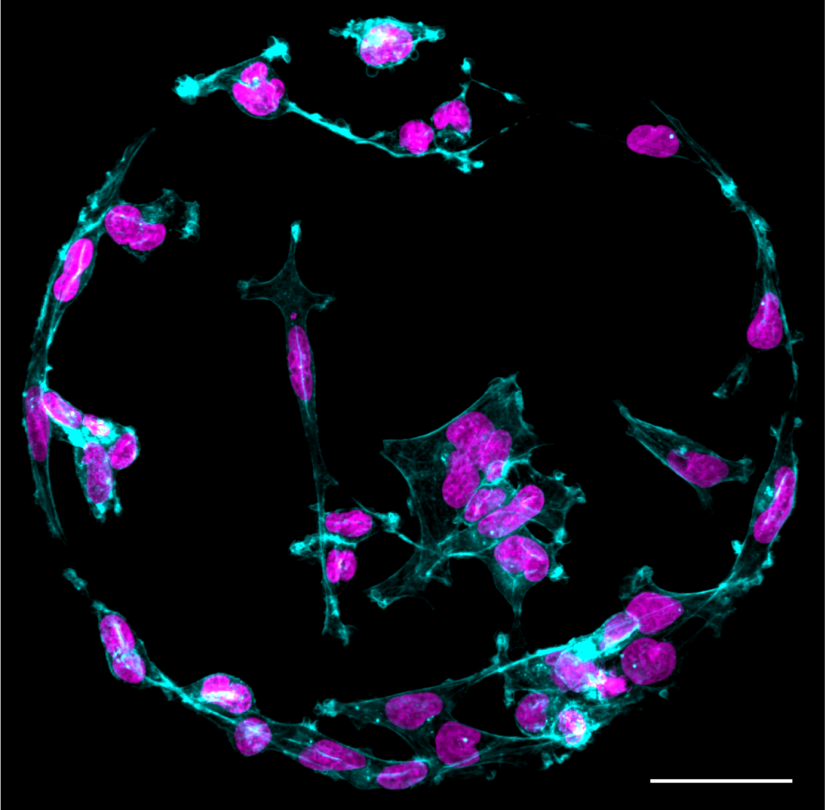Reviewed by Danielle Ellis, B.Sc.Oct 19 2023
A collaborative research team from the University of Turku and Turku Bioscience Centre, in conjunction with Misvik Biology Ltd in Finland, has introduced a novel technique for investigating the behavior of cancer cells in both softer and stiffer tissue environments.
 Figure showing cancer cells (Osteosarcoma cells) on a printed protein spot. Scale bar: 50 μm. Image Credit: Turku Bioscience Centre/James Conway and Hellyeh Hamid
Figure showing cancer cells (Osteosarcoma cells) on a printed protein spot. Scale bar: 50 μm. Image Credit: Turku Bioscience Centre/James Conway and Hellyeh Hamid
It has long been assumed that cells, when cultured outside the body, tend to prefer spreading and proliferating on rigid surfaces. This analogy can be likened to human preference for walking on a firm concrete sidewalk over a soft, muddy path.
Consequently, cells, including stem cells, have traditionally been cultivated on stiff plastic or glass substrates for research purposes. This concept also aligns with the idea of cancer cells thriving within the dense, solid masses they form in tissues.
Typically, the stiffer the tumor, the bleaker the prognosis for patients. However, it is important to note that the stiffness of tissues within the human body varies; for instance, bone tissue is considerably stiffer than brain tissue. Moreover, certain cell types, such as neurons and adipocytes, are highly functional and thrive in softer microenvironments.
The University of Turku and Turku Bioscience Centre research team joined Misvik Biology Ltd, a biotechnology firm located in Turku, Finland, to gain insights into cell behavior within softer environments and to improve the representation of these conditions outside the human body. They employed computational modeling and a comprehensive range of growth conditions to conduct a thorough and high-resolution comparison of cell behavior on both soft and stiff surfaces.
New Perspective on an Old Idea
The researchers employed an automated machine to microprint various protein mixtures onto both soft and stiff surfaces. These selected proteins are the ones typically found surrounding cells in the body, providing texture and conveying essential information about the tissue environment.
By using more diverse protein mixtures in cell culture, we begin to get closer to a more physiologically relevant setting outside the body with which we can more effectively model diseased and healthy states.”
Dr James Conway, Lead Researcher, Turku Bioscience Team
Dr James Conway is associated with the InFLAMES research flagship.
CEO Juha Rantala from Misvik, a key collaborator on the project notes, “We had a specific system for microcontact printing of different protein mixtures onto culture plates and decided to see how we could expand the system. Once the researchers at Turku Bioscience had the idea, it was straightforward for us to then use the system on different stiffness hydrogels.”
The team identified that the correct combination of proteins can support cells on a soft surface, offering key survival cues that eventually result in cell growth similar to that seen on a stiffer surface.
These findings have unveiled a fundamental new perspective in mechanobiology. We have identified a mechanism through which we can explain how cells can effectively adhere, function, and signal on soft substrates. This insight challenges the existing paradigm, opening up new possibilities for research in cancer biology and tissue engineering.”
Johanna Ivaska, Professor and Principal Investigator, University of Turku
Source:
Journal reference:
Conway, J. R. W., et al. (2023). Defined extracellular matrix compositions support stiffness-insensitive cell spreading and adhesion signaling. Proceedings of the National Academy of Sciences of the United States of America. https://doi.org/10.1073/pnas.2304288120.